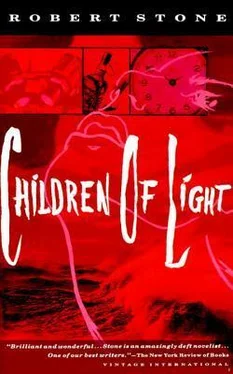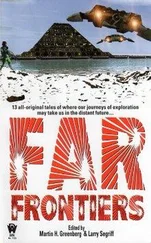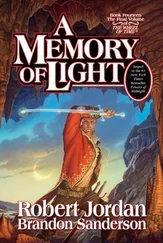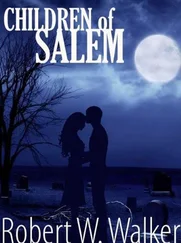Robert Stone - Children of Light
Здесь есть возможность читать онлайн «Robert Stone - Children of Light» весь текст электронной книги совершенно бесплатно (целиком полную версию без сокращений). В некоторых случаях можно слушать аудио, скачать через торрент в формате fb2 и присутствует краткое содержание. Год выпуска: 1992, Издательство: Vintage, Жанр: Современная проза, на английском языке. Описание произведения, (предисловие) а так же отзывы посетителей доступны на портале библиотеки ЛибКат.
- Название:Children of Light
- Автор:
- Издательство:Vintage
- Жанр:
- Год:1992
- ISBN:нет данных
- Рейтинг книги:4 / 5. Голосов: 1
-
Избранное:Добавить в избранное
- Отзывы:
-
Ваша оценка:
- 80
- 1
- 2
- 3
- 4
- 5
Children of Light: краткое содержание, описание и аннотация
Предлагаем к чтению аннотацию, описание, краткое содержание или предисловие (зависит от того, что написал сам автор книги «Children of Light»). Если вы не нашли необходимую информацию о книге — напишите в комментариях, мы постараемся отыскать её.
Children of Light — читать онлайн бесплатно полную книгу (весь текст) целиком
Ниже представлен текст книги, разбитый по страницам. Система сохранения места последней прочитанной страницы, позволяет с удобством читать онлайн бесплатно книгу «Children of Light», без необходимости каждый раз заново искать на чём Вы остановились. Поставьте закладку, и сможете в любой момент перейти на страницу, на которой закончили чтение.
Интервал:
Закладка:
“It’s a shakedown,” Jack Best croaked.
“I see,” young Walter Drogue said. “What shall we do, Jack? I mean, I’ve heard of these things happening in the business. But I’ve never actually encountered it until now.”
Jack cleared his throat. He looked from side to side in a conspiratorial fashion.
Drogue put a cupped hand to the side of his mouth.
“You can talk here, Jack,” he whispered. “Right, Patty?”
“Righto,” Patty Drogue whispered back.
“It was Madriaga,” Jack told him. Madriaga was the jefe of the unit’s Mexican teamsters, a vicious clownish former policeman. “He come up to me. He was a cop, you see. They went to him. The ones that took the shots. He come to me. They want five big ones. Or they put it out. The reporter that’s here. They would give it to him. And around. Europe. England and France. Worldwide. It’s like before. You could ask your father. When Eddie Ritz had these pictures of Mitch.”
“Bless my soul, Jack,” Drogue said, “I can’t understand a word you’re saying.” He turned to his wife. “Can you, dear?”
Patty shook her head. “I liked it, though. I liked it when he said five Big Ones.”
“What are Big Ones, Jack?” Drogue asked.
“A grand,” Jack said urgently. “A thou.” His voice rose in panic. “A thousand dollars.”
Drogue took Jack’s empty glass from his unsteady hand.
“Jack,” Walter Drogue junior said, “that’s blackmail. Who would do such a thing? Not someone on our set? Not one of our own?”
Best began to titter and chatter in an almost simian fashion.
“Plenty of them. They ain’t got any — they don’t care anymore. They treat you like dirt. Just look around. They ain’t no good, Walter. They’ll make bad publicity. Shit where they eat.”
“I’m no good at this,” Drogue said dejectedly. “I can’t even follow you. What do we have to do, Jack? Will it involve telling Charlie? Will I have to give you money?”
“I could tell you,” Jack stammered, “if you ask your old man. I can handle them. Shakedown artists. I got ways. Like when they had Mitch’s picture.”
“Maybe we should call the police,” Patty Drogue suggested.
“The inside of a Mexican jail,” Drogue said with hearty indignation. “That’s the place for these dirty blackmailers. How about that, Jack?”
“No,” Jack said.
“No?” Young Drogue picked up the wireless house telephone on one of his bookshelves and began to dial. “You think not, Jack? Think we should pass on that one? A no-no?” When he had finished dialing, he picked up a pen and began doodling on a note pad.
“No cops,” Jack said. “I mean, Mexican cops? I mean, you’d gotta be crazy. You gotta leave it to me.” He stared at the futuristic telephone receiver in young Drogue’s hand. “I can handle it.”
“How would you do it, Jack?” He looked angrily at the wireless phone receiver. He had not obtained a connection. “Fucking thing,” he muttered. The sight of his unhappy public relations adviser seemed to soothe him. “Would you do it like they did it before Marty ? Would you do it like they did it before sound ?”
“Hey, Wally,” Jack said, “Walter — I never worked before sound, Walter. My first picture was with Dick Powell. That was sound.”
Drogue was dialing again.
“Axelrod?” he said into the phone. “Put him on.”
Jack turned to Patty Drogue. “Dick Powell,” he said.
Drogue sat waiting for Axelrod’s response, holding the miniature receiver in a clenched fist beneath his chin. Jack Best began to stare at the device with such intensity that the young director’s attention was diverted.
“Did you want to see this, Jack?” he asked kindly.
In his confusion and haste to be agreeable, Jack nodded eagerly. He reached out for the sleek receiver with such gleeful anticipation that it was possible to see why he had once been called Smilin’ Jack Best. At the last moment Drogue withdrew it from the old man’s soiled grasping reach.
“It’s a telephone, Jack,” he snarled. Jack cringed. “Axelrod!” he said into the receiver. “I got this grotesque situation to cope with. You want to give me a hand?” He looked at Best. “A man’s supposed to be an artist,” he said ill-temperedly. “Instead you end up as a carny boss.”
Jack Best could not reply. His face was trapped in the rigor of his own smile. No matter how hard he attempted to disengage his features from their merry aspect, he was unable to do so. He turned from the young director to the latter’s wife. Patty twinkled back at him. She was holding a Polaroid Instamatic. Rising, she stalked the publicist.
“Now, Jack,” she cooed, “we’ll see what you really truly look like.”
Jack wrenched his jaw into motion.
“Chrissakes,” he protested. “I seen it was a phone, Walter. I mean, chrissakes. I think my glasses … my specs … I seen it was a phone, Walter.”
Now the Drogues inclined together, watching for images of Jack Best to form on the blank print. They seemed rapt.
“When a thing fits in your hand,” Jack explained, “you gotta be sharp. Like the pics. You aren’t sharp, they’ll kick your teeth in. I know, Walter, because I been there. They say — he’s a nice fella and they eat you alive. Walter? Am I right or wrong?”
“Ooh,” Patty Drogue said, “there he is, the old scamp.” She tore free the Polaroid print of Jack’s photograph and handed it to him. Jack looked down into his own smiling face.
“Walter,” he said. “Honest to God, I dealt with the roughest and toughest, and the good of the organization was all that mattered to me. You could ask your father. It was dog cat dog. Murder. A jungle.” He set the ghastly picture of himself on the shelf beside the strange little telephone. Beside it was the pad on which young Drogue had been doodling. On the pad he read the words: “Five Beeg Wons.” He began to weep.
Patty Drogue leveled the Instamatic at him, giving no quarter.
“You shouldn’t,” Jack said. He raised his hands to cover his face but she made the shot. Jack fought for breath.
“It was …” he tried to say. “It was …”
Patty lowered her camera and ran at him. She thrust her face into his. Her voice, when she spoke, was a comic rasp.
“It was money talks — before Marty !” she growled. “It was bullshit walks — before sound !”
She stepped back and pulled out the print of her latest snapshot.
“Oh, see!” she cried as the print came into composition. She showed it to her husband triumphantly as though she were vindicating her position in some point under dispute. “See how he looks?”
Instead of looking at the picture, Drogue looked directly at the cringing man.
“He looks,” the young director said, “like Abbott and Costello are waiting for him.”
A brisk alarming triple knock sounded against the bungalow door. The sound was muted and urgent and had nothing of good news about it.
Walker had been reading New York Arts on the patio while Lu Anne slept. He put the magazine aside and opened the door to Axelrod.
“You’re a stupid fuck,” the unit manager told him.
Walker was taken aback. Openings like Axelrod’s usually presaged a narrative of nights forgotten, and he was quite certain that he could account for the entire period since his arrival.
“Look at this,” Axelrod said, and handed him an envelope of photographs. When he had looked at them, he went back to the patio table where he had been reading and sat back down. Axelrod followed him.
“Taken today, right, Gordon?”
“No question.”
“You never heard of shades?”
Walker looked out to sea. A darkening cloud bank hovered on the horizon, supporting a gorgeous half rainbow.
Читать дальшеИнтервал:
Закладка:
Похожие книги на «Children of Light»
Представляем Вашему вниманию похожие книги на «Children of Light» списком для выбора. Мы отобрали схожую по названию и смыслу литературу в надежде предоставить читателям больше вариантов отыскать новые, интересные, ещё непрочитанные произведения.
Обсуждение, отзывы о книге «Children of Light» и просто собственные мнения читателей. Оставьте ваши комментарии, напишите, что Вы думаете о произведении, его смысле или главных героях. Укажите что конкретно понравилось, а что нет, и почему Вы так считаете.












